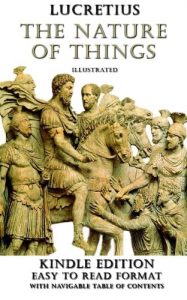Illustrated Edition.
by Titus Lucretius Carus (known as Lucretius
born circa 99 B.C. and died in 55 B.C.),
‘The Nature of Things’ is an epic six-book poem that is the foundational work for the philosophical belief system known as Epicureanism. Epicureans believed pleasure to be the greatest good but the way to attain this was to live modestly and to gain knowledge of the workings of the world and the limits of one's desires. Following this belief system was intended to allow one to attain a state of tranquility, freedom from fear, and the absence of bodily pain.
"De rerum natura" is often translated as 'On the Nature of Things' or 'On the Nature of The Universe'. This classic work covers an incredibly broad range of fascinating topics as listed below.
Easy to read Kindle Edition
This easy-to-read Kindle edition has navigable Table of Contents so you can easily access all six books of The Nature of Things.
BOOK I
The Void
Nothing Exists Per Se Except Atoms and the Void
Character of the Atoms
Confutation of Other Philosophers
The Infinity of the Universe
BOOK II
Atomic Motions
Atomic Forms and Their Combinations
Absence of Secondary Qualities
Infinite Worlds
BOOK III
Nature and Composition of the Mind
The Soul is Mortal
Folly of the Fear of Death
Cerberus and Furies, and that Lack of Light
BOOK IV
Existence and Character of the Images
The Senses and Mental Pictures
Some Vital Functions
The Passion of Love
BOOK V
Argument of the Book and New Proem Against Teleological
Concept
The World is Not Eternal
Of the immeasurable aeons old
Formation of the World and Astronomical Questions
Origins of Vegetable and Animal Life
Origins and Savage Period of Mankind
Beginnings of Civilization
Now for the rest: copper and gold and iron
BOOK VI
Great Meteorological Phenomena, Etc
Extraordinary and Paradoxical Telluric Phenomena
The Plague Athens
The Nature of Things
by Titus Lucretius Carus (known as Lucretius
born circa 99 B.C. and died in 55 B.C.),
‘The Nature of Things’ is an epic six-book poem that is the foundational work for the philosophical belief system known as Epicureanism. Epicureans believed pleasure to be the greatest good but the way to attain this was to live modestly and to gain knowledge of the workings of the world and the limits of one's desires. Following this belief system was intended to allow one to attain a state of tranquility, freedom from fear, and the absence of bodily pain.
"De rerum natura" is often translated as 'On the Nature of Things' or 'On the Nature of The Universe'. This classic work covers an incredibly broad range of fascinating topics as listed below.
Easy to read Kindle Edition
This easy-to-read Kindle edition has navigable Table of Contents so you can easily access all six books of The Nature of Things.
BOOK I
The Void
Nothing Exists Per Se Except Atoms and the Void
Character of the Atoms
Confutation of Other Philosophers
The Infinity of the Universe
BOOK II
Atomic Motions
Atomic Forms and Their Combinations
Absence of Secondary Qualities
Infinite Worlds
BOOK III
Nature and Composition of the Mind
The Soul is Mortal
Folly of the Fear of Death
Cerberus and Furies, and that Lack of Light
BOOK IV
Existence and Character of the Images
The Senses and Mental Pictures
Some Vital Functions
The Passion of Love
BOOK V
Argument of the Book and New Proem Against Teleological
Concept
The World is Not Eternal
Of the immeasurable aeons old
Formation of the World and Astronomical Questions
Origins of Vegetable and Animal Life
Origins and Savage Period of Mankind
Beginnings of Civilization
Now for the rest: copper and gold and iron
BOOK VI
Great Meteorological Phenomena, Etc
Extraordinary and Paradoxical Telluric Phenomena
The Plague Athens






